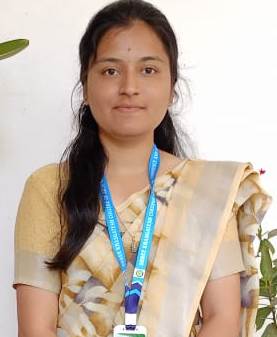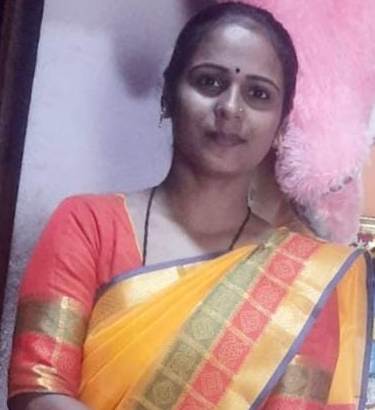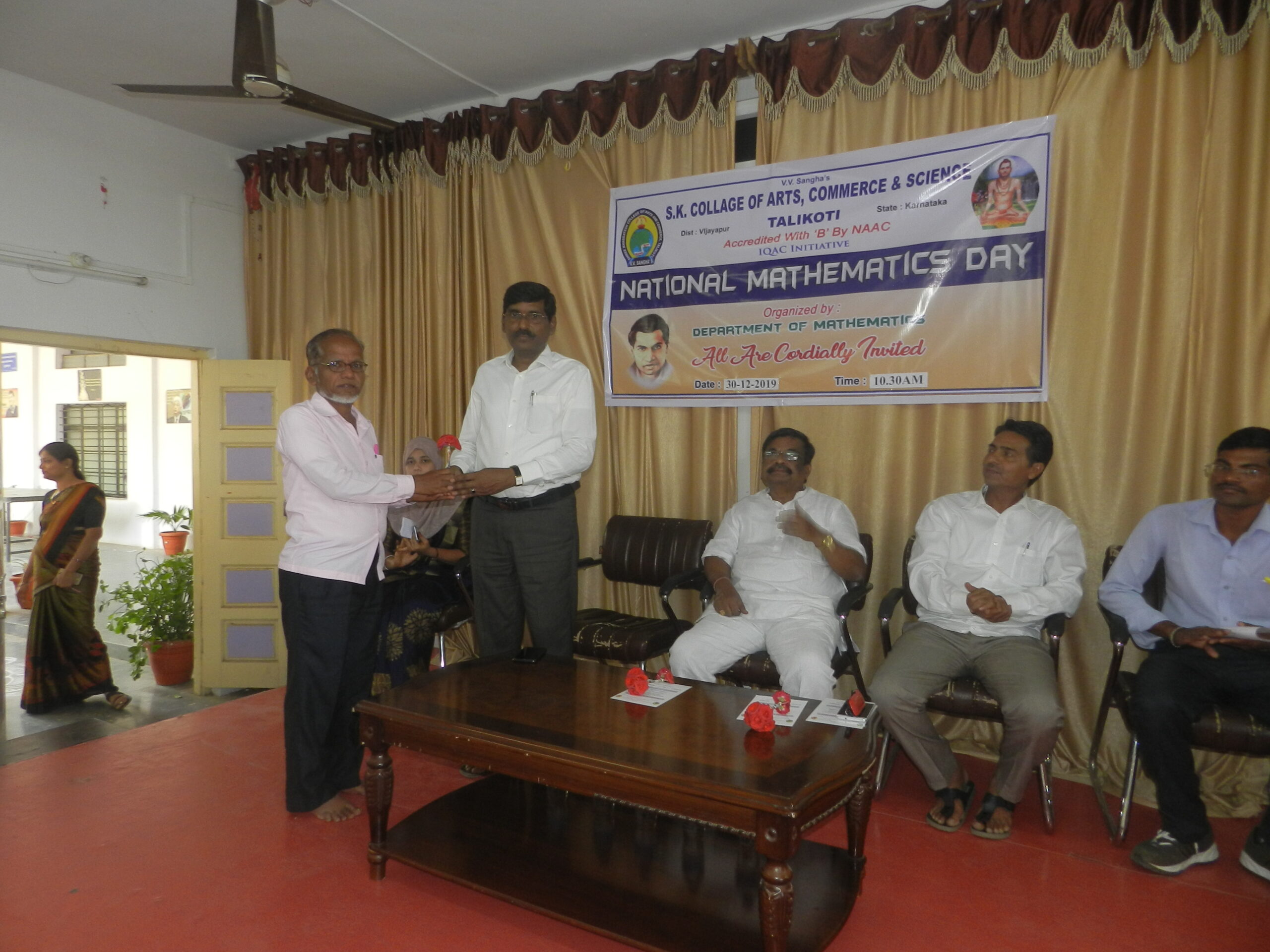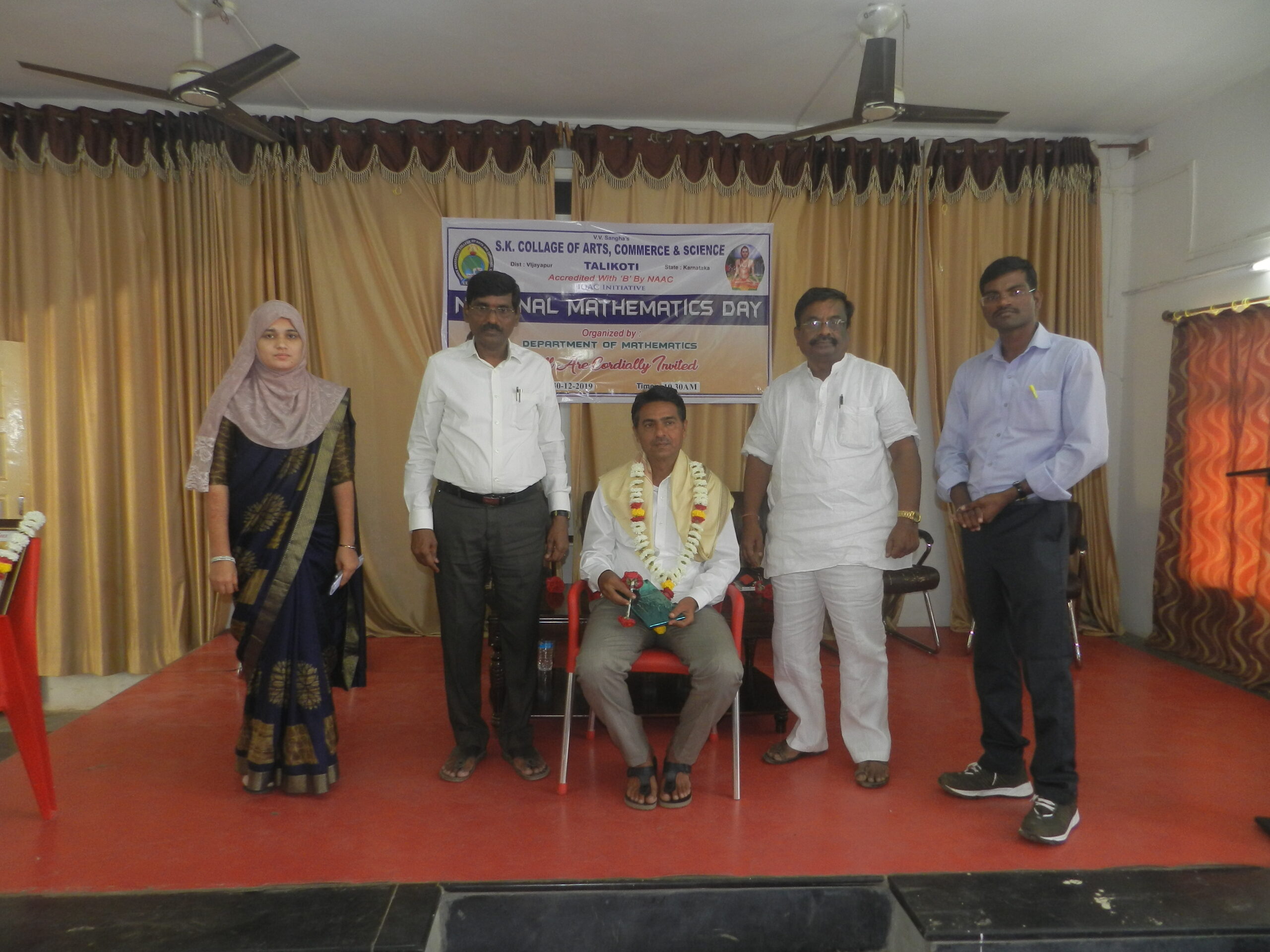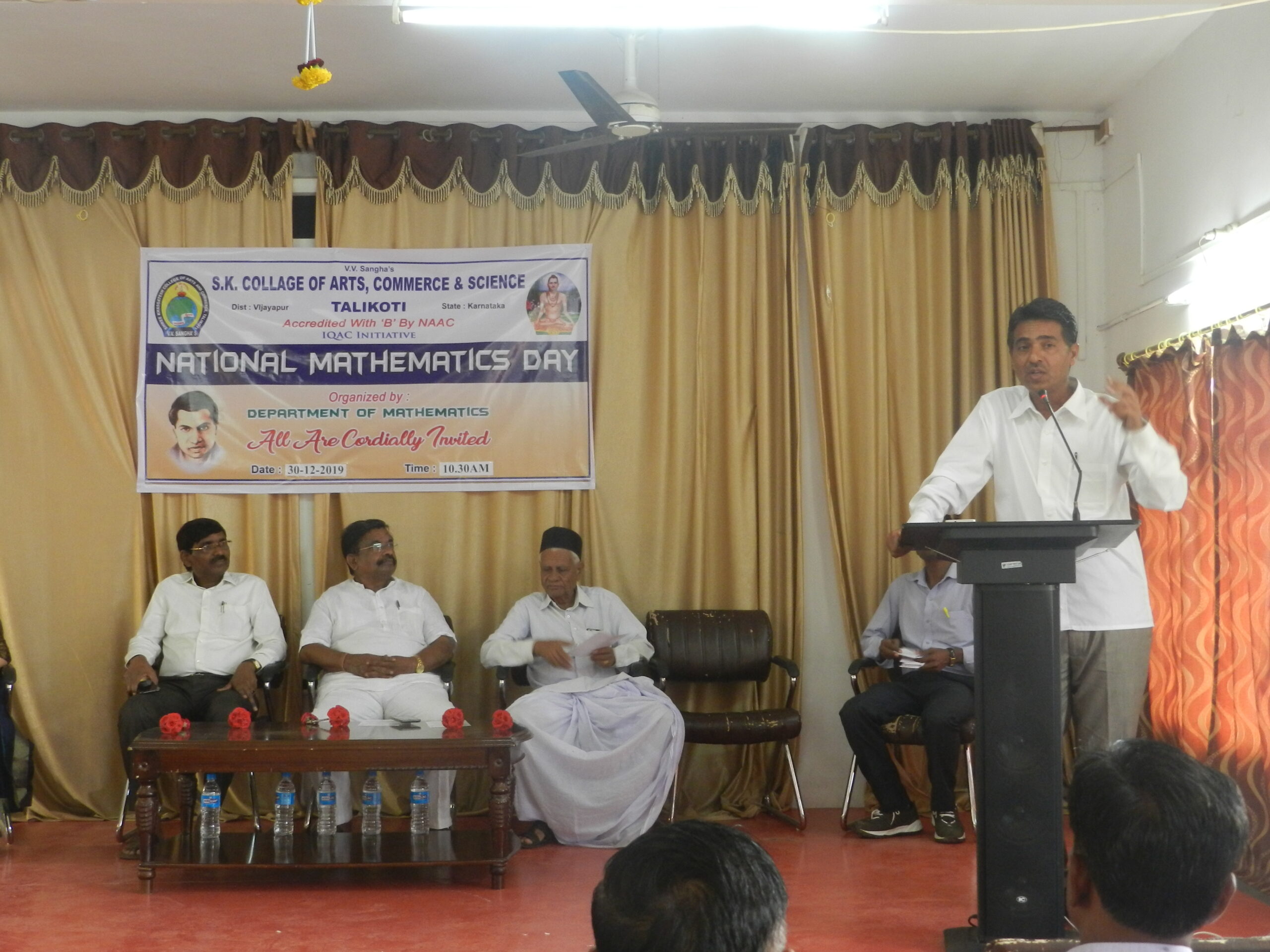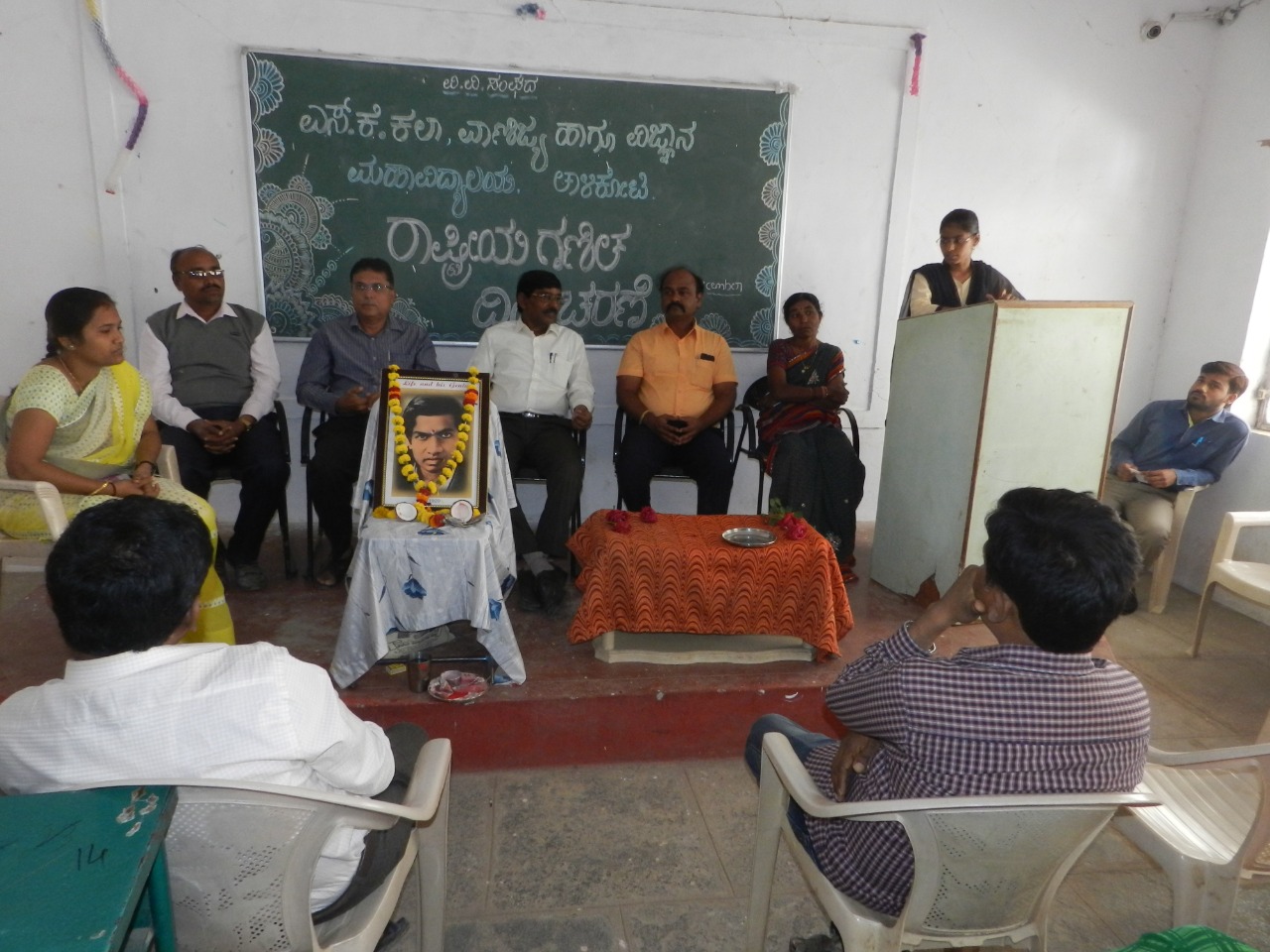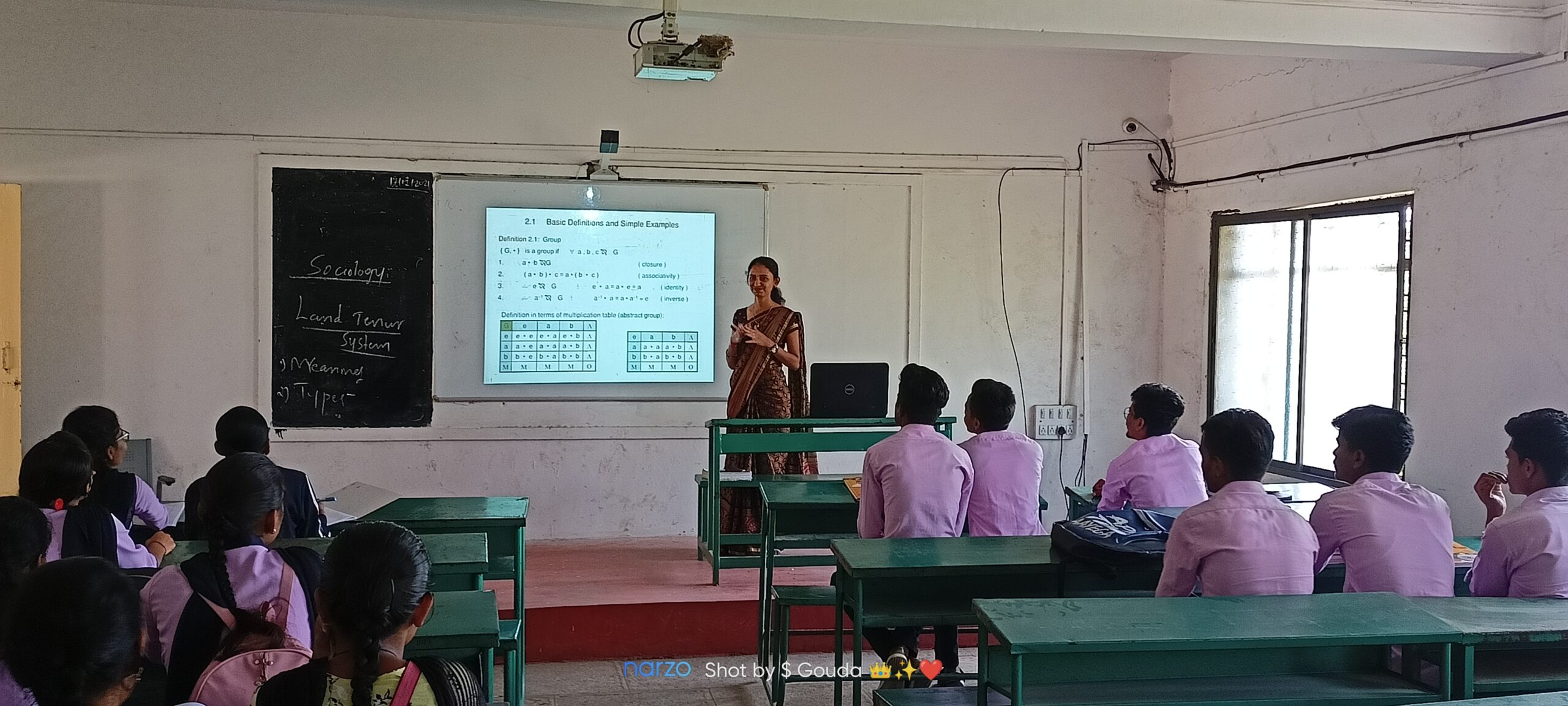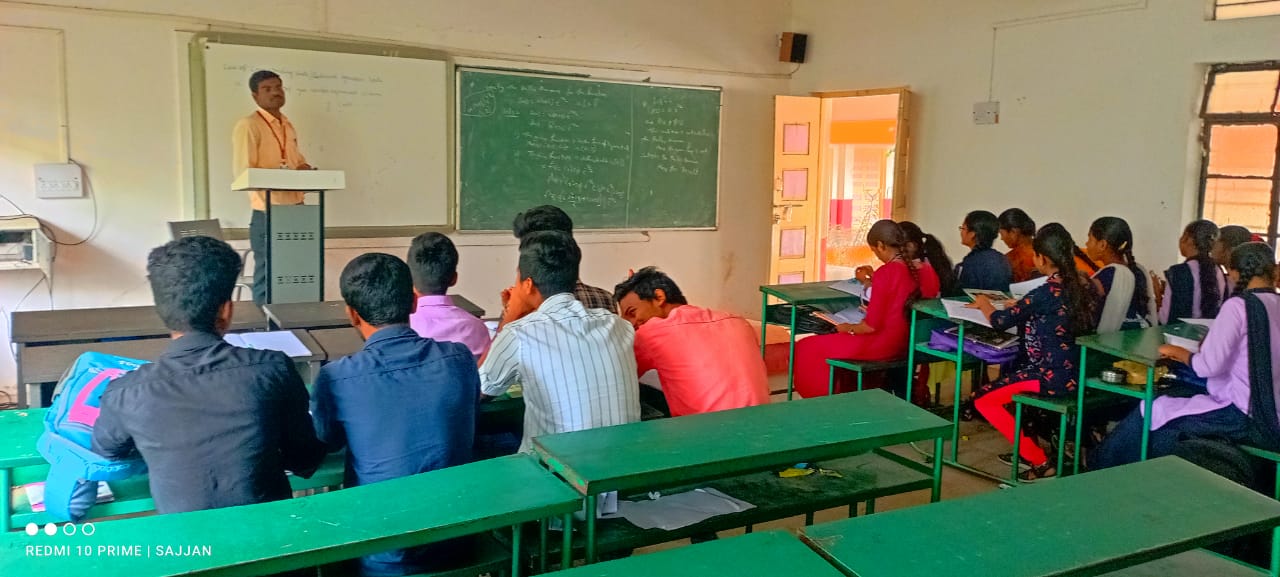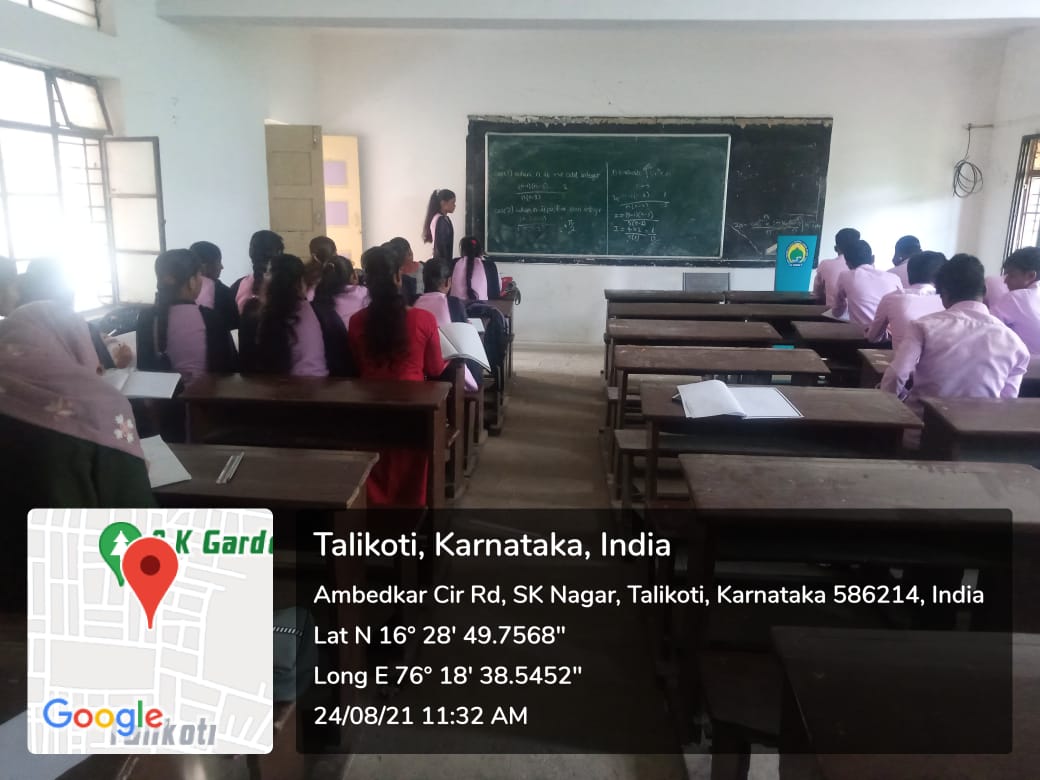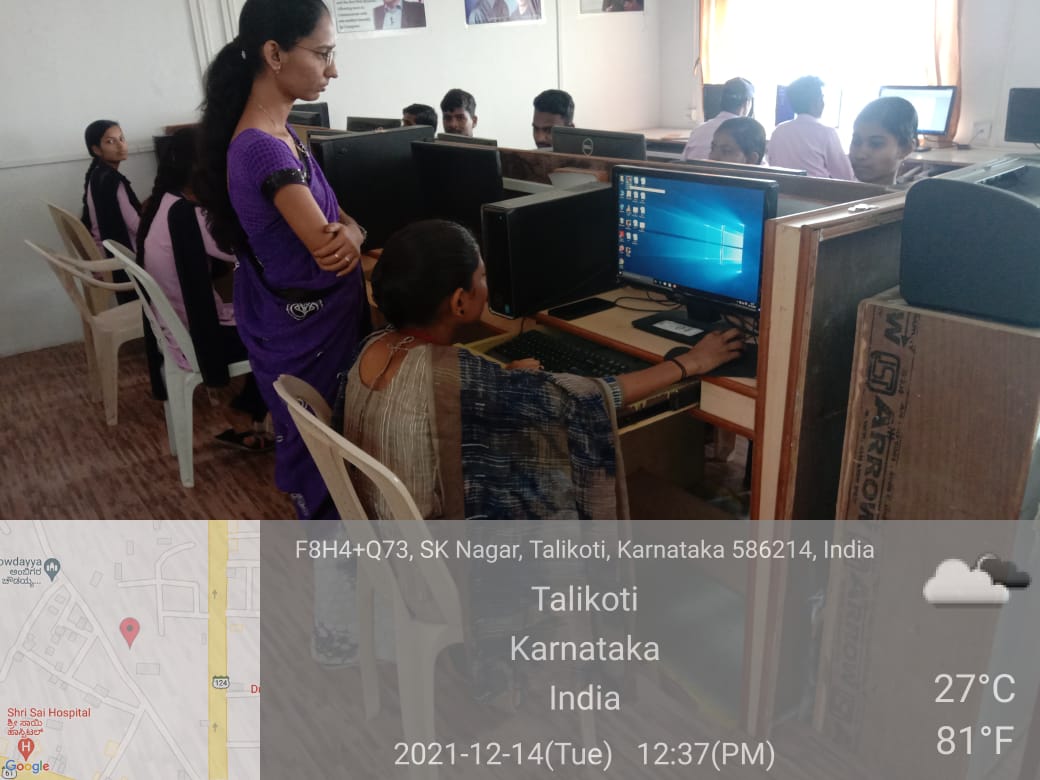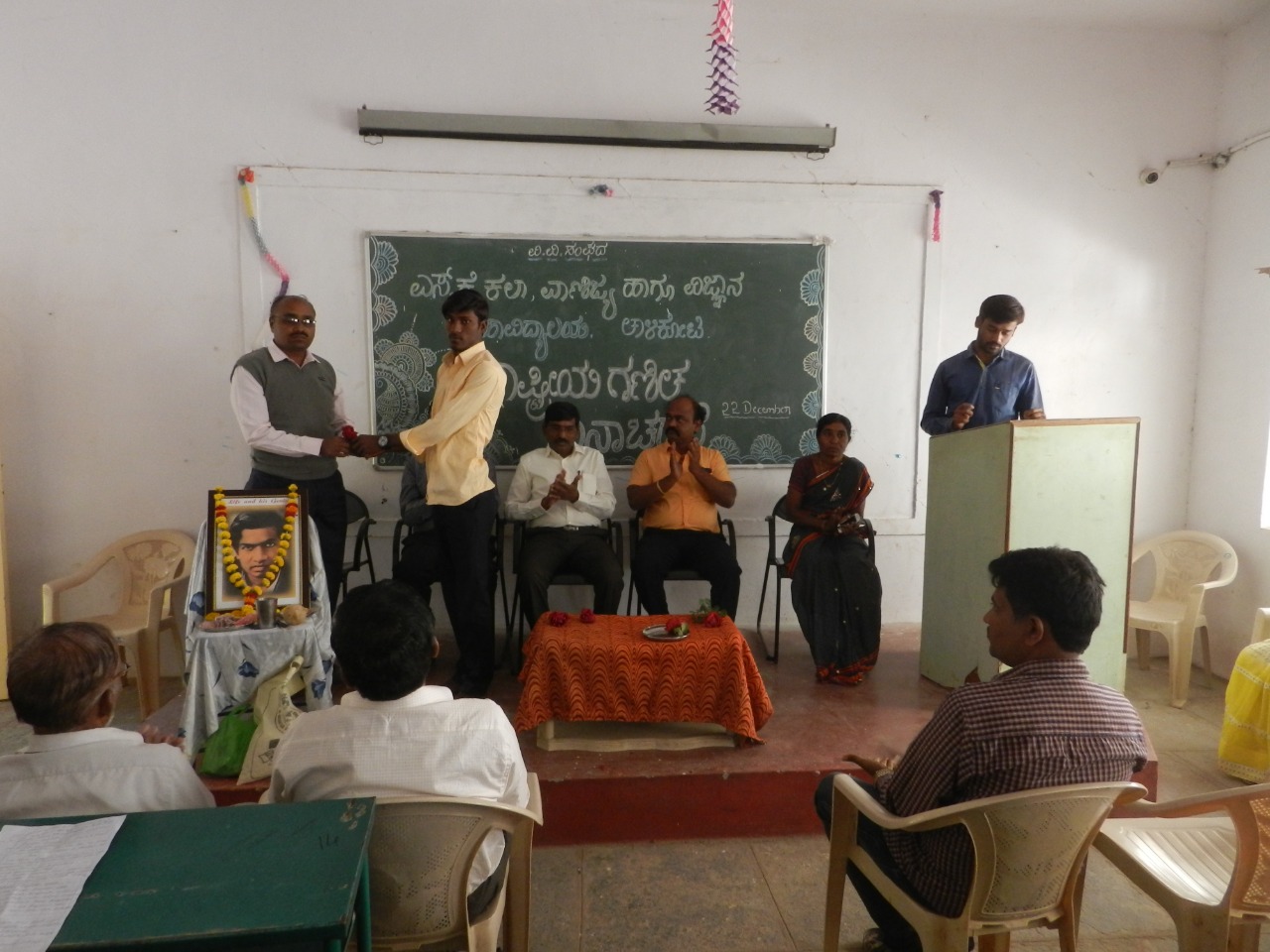Program Outcome:
|
Programme
|
Objectives
|
|
PO1: Understand of Fundamental Knowledge
|
Definition, Concept, Principles,Types,Methods etc
|
|
PO2: Experimental Learning Methods
|
Sectioning, Mounting, Instruments Handlings,
Demonstrations, Analysis
|
|
PO3: Opportunities
|
Higher Educations ,Competitive exams, Self Business and job Carrier.
|
Program Specific Outcome:
|
Programme
|
Objectives
|
|
PSO1: Acquiring basic knowledge.
|
Definition, Concept, Types, Principles, Functions.
|
|
PSO2: Formulation of Equations
|
Aim and goal of the system.
|
|
PSO3: Enhance Skills
|
Brain teasers, Fish bone activity
|
|
PSO4: Approach of Scientific temper.
|
Applications of logic, Working mechanism of Mathematical instruments.
|
|
PSO5: Development of Designing skills.
|
Flow charts, Diagrams, Models and graphs.
|
|
PSO6: Beauty of Mathematics in nature.
|
Fibonacci Series.
|
|
PSO7: Research Methodology in Mathematics
|
Reliability and validity of research within the field of mathematics education.
|
|
PSO8: Building Applied Skills in Environmental Skills.
|
Building of Dams and Roads, Forest Management.
|
|
PSO9: Mathematics is the Candle of all Creations.
|
Be it a cook or a Farmer, a Carpenter or a mechanic, a shopkeeper or a Doctor, an Engineer or a Scientists, a musician or a magician, everyone needs mathematics in there day today life.
|
|
PSO10: Self Employment.
|
Vedic maths, Reasoning, short tricks for competitive exam, Quantitative aptitude.
|
B.Sc I Semester , Paper-I (Differential Calculus)
CO1-Student will learn concept of Real numbers.
CO2-Students will learn knowledge about limits and continuity.
CO3-Students will get the knowledge of Higher order Derivatives.
CO4-Students will learn and understand Mean Value Theorems.
CO5-They will understand about Indeterminate Forms.
B.Sc I Semester , Paper-II (Algebra and Trigonometry)
CO1-Students will learn about the Determinants.
CO2-Students will learn knowledge abouts the Matrices.
CO3-Students will learn about the process of Set Theory.
CO4-Students will learn about the Theory of Equations.
CO5-They will learn the structure and function of Trigonometry Functions.
B.Sc II Semester, Paper-I (Differential and Integral Calculus)
CO1-Students will learn concept of Angle between Radius vector and Tangent, Polar and Pedal equations.
CO2-Students will learn knowledge about Derivative of arc length, Curvature, Radius of curvature.
CO3-Students will get the knowledge of Limits and continuity of functions of two variables.
CO4-Students will learn and understand Concavity and convexity and point of Inflexion.
CO5-They will understand about Reduction formulae.
B.Sc II Semester, Paper-II (Algebra and Geometry)
CO1-Student will learn about the Boolean Algebra.
CO2-Students will learn knowledge about the Number theory.
CO3-Students will learn about the process of Sphere.
CO4-Students will learn about the Cone.
CO5-They will learn the structure of Cylinder.
B.Sc III Semester, Paper-I (Mathematical Logic and Real Analysis)
CO1-Student will learn concept of Mathematical logic.
CO2-Students will gain knowledge about Jacobians and mean value theorems.
CO3-Students will gain the knowledge of Maxima and Minima of two and three variables.
CO4-Students will learn and understand limit of a sequence , Bounded and unbounded sequence.
CO5-They will understand about criterion for convergence of Sequence.
B.Sc III Semester,Paper-II
(Group theory, Integral Calculus and Differential Equations)
CO1-Students will learn about the Meaning of Group, its types and properties of Group.
CO2-Students will learn knowledge about the cyclic group, cosets.
CO3-Students will learn about the process Applications of Definite Integrals.
CO4-Students will learn about the First order first degree equation and its types.
CO5-They will learn the first order higher degree differential equation.
B.Sc IV Semester, Paper-I (Vector calculus and infinite series)
CO1-Students will learn concept of Dot and cross product.
CO2-Students will learn knowledge about the differential operators.
CO3-Students will get the knoeledge of infinite series and its convergent, divergent and oscillatory series.
CO4-Students will learn and understand Different types of Tests for Convergent, Divergent and Oscillatory series.
CO5-They will understand about Different types of convergence.
B.Sc IV Semester, Paper-II
(Group theory, Fourier Series and Differential Equations)
CO1-Students will learn about the Meaning of Normal Subgroup, Homomorphism and Isomorphism.
CO2-Students will learn knowledge about the Fourier Series.
CO3-Students will learn about the Fourier Transforms.
CO4-Students will learn about the Linear differential Equations of nth Order with constants coefficients.
CO5-They will learn the Homogeneous linear differential equation of nth order.
B.Sc V Semester, Paper-I (Real Analysis)
CO1-Students will Study the Riemann Integration.
CO2-Student will gain Knowledge about Mean Value Theorems in Riemann Integration.
CO3-Student will Learn about the “Methods of Improper Integrals.
CO4-Students will learn about the Beta and Gamma Function.
CO5-They will learn the Multiple Integrals.
B.Sc V Semester, Paper-II (Numerical Analysis)
CO1-Students will Study about solutions of Algebraic and Transcendental Equations.
CO2-Student will get the Knowledge about Finite Differences.
CO3-Student will Learn about the Numerical Differentiation.
CO4-Students will learn about the Solutions of Initial Value Problems.
CO5-They will learn the Difference Equations.
B.Sc V Semester, Paper-III (Dynamics and Calculus of Variations)
CO1-Students will Study about the Kinematics.
CO2-Student will get the Knowledge about the Central Orbits.
CO3-Student will Learn about the Motion of Projectile.
CO4-Students will learn about the Calculus of Variations.
CO5-They will learn the Geodesic on a plane, on a sphere.
B.Sc VI Semester, Paper-I (Differential Equations)
CO1-Students will get the knowledge of Differential Equations.
CO2-Student will gain the Knowledge on Series of solutions of Ordinary Differential Equations.
CO3-Student will understand the Legendre Equations and Functions
CO4-Students will learn about the Partial Differential Equations of First Order.
CO5-They will learn the Non linear differential equations.
B.Sc VI Semester, Paper-II (Complex Analysis and Ring Theory)
CO1-Students will Study the Basic Knowledge of Complex Analysis.
CO2-Student will get the Knowledge of Complex Integration.
CO3-Student will understand the Tayler’s and Laurent’s Series.
CO4-Students will learn about the Residue Theorems.
CO5-They will learn about the Rings and Integral Domains.
B.Sc VI Semester, Paper-III (Topology and Laplace Transforms)
CO1-Students will understand the Basic Knowledge of Topology.
CO2-Student will get the Knowledge of Base and Sub Base.
CO3-Student will understand the Basic Knowledge of Laplace Transforms.
CO4-Students will learn about the Laplace transforms of Periodic Functions.
CO5-They will learn about the Heabiside functions and Convolutions Theorems.
CBCS Syllabus
B.Sc I Semester, Paper (Algebra-I and Calculus-I)
CO1-Students will learn about the Matrices and Determinants.
CO2-Student will learn Concept of Real Numbers.
CO3-Student will gain the knowledge about Limits and Continuity.
CO4-Students will understand about the Indertminants Forms.
CO5-Students will learn about the Higher order Derivatives.
CO6- Students will learn and understand the Mean Value Theorems.
B.Sc I Semester, Paper (Algebra-I and Calculus-I)
PCO1-Students will gain the knowledge about the operations of Matrices with Programmes.
PCO2-Student will understand the concepts of Trance and Transpose of Matrices with programmes.
PCO3-Student will gain the knowledge about Solutions of system of Homogeneous Equations.
B.Sc II Semester, Practical Paper
CO1-Students will learn Concept of Angle between Radius Vector and Tangent, Polar and Pedal Equations.
CO2-Student will learn knowledge about the Derivative of Arc length, Curvature and Radius of Curvature.
CO3-Student will get the knowledge of Limits and Continuity of Functions of Two Variables.
CO4-Students will understand about the Reduction Formulae.
CO5-They will learn about the Sphere, Cone and Cylinder.
B.Sc II Semester, Practical Paper
PCO1-Students will gain the knowledge about Sequence of odd numbers, even Numbers and Prime numbers with programmes.
PCO2-Student will understand the concepts of the Tracing of Curves with Programmes.
PCO3-Student will gain the knowledge about Tracing of Curves in 3-D.
NEP Mathematics Syllabus
B.Sc I Semester , Paper-I (Algebra – I and Calculus – I)
This course will enable the students to
- Learn to solve system of linear equations.
- Solve the system of homogeneous and non-homogeneous linear of m
equations in n variables by using concept of rank of matrix, finding
eigen values and eigen vectors.
- Sketch curves in Cartesian, polar and pedal equations
- Students will be familiar with the techniques of integration and
differentiation of function with real variables.
- Identify and apply the intermediate value theorems and L’ Hospital
rule.
Practical’s on Algebra – I and Calculus – I
This course will enable the students to
- Learn Free and Open Source Software (FOSS) tools for computer
programming
- Solve problem on algebra and calculus theory studied in MATDSCT 1.1 by using FOSS software.
- Acquire knowledge of applications of algebra and calculus through FOSS
Practical/Lab Work to be performed in Computer Lab (FOSS).
Suggested Software’s: Maxima /Scilab /Maple /MatLab /Mathematica /Phython /R.
OE Mathematics Syllabus:
This course will enable the students to
- Learn to solve system of linear equations.
- Solve the system of homogeneous and non-homogeneous m linear
equations by using the concept of rank of matrix, finding eigen values
and eigen vectors.
- Students will be familiar with the techniques of differentiation of
function with real variables.
- Identify and apply the intermediate value theorems and L’ Hospital
rule.
- Learn to trace some standard curves.
For Students of other than Science Stream
This course will enable the students to
- Translate the real word problems through appropriate mathematical
modellling.
- Explain the concepts and use equations, formulae and mathematical
expression and relationship in a variety of context.
- Finding the extreme values of functions.
- Analyze and demonstrate the mathematical skill require in mathematically intensive areas in economics and business.
B.Sc II Semester , Paper-I (Algebra – II and Calculus – II)
This course will enable the students to
- Recognize the mathematical objects called Groups.
- Link the fundamental concepts of groups and symmetries of geometrical objects.
- Explain the significance of the notions of Cosets, normal subgroups and factor groups.
- Understand the concept of differentiation and fundamental theorems in differentiation and various rules.
- Find the extreme values of functions of two variables.
Practical’s on Algebra – II and Calculus – II
This course will enable the students to
- Learn Free and Open Source Software (FOSS) tools for computer
programming
- Solve problem on algebra and calculus by using FOSS software’s.
- Acquire knowledge of applications of algebra and calculus through FOSS
- Practical/Lab Work to be performed in Computer Lab.
Suggested Software’s: Maxima/ Scilab/ Maple/ MatLab/ Mathematica /Phython/ R.
OE Mathematics Syllabus:
This course will enable the students to
- Recognize the mathematical objects called Groups.
- Link the fundamental concepts of groups and symmetries of
geometrical objects.
- Explain the significance of the notions of Cosets, normal subgroups and
factor groups.
- Understand the concept of differentiation and fundamental theorems
in differentiation and various rules.
- Find the extreme values of functions of two variables.
- To understand the concepts of multiple integrals and their
applications.
For Students of other than Science Stream
This course will enable the students to
- Integrate concept in international business concept with functioning of global trade.
- Evaluate the legal, social and economic environment of business.
- Apply decision-support tools to business decision making.
- Will be able to apply knowledge of business concepts and functions in an integrated manner.

